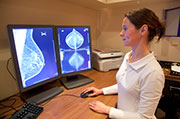- Double Mastectomy May Offer No Survival Benefit to Women With Breast Cancer
- Toxic Lead Found in Cinnamon Product, FDA Says
- Certain Abbott Blood Sugar Monitors May Give Incorrect Readings
- Athletes Can Expect High Ozone, Pollen Counts for Paris Olympics
- Fake Oxycontin Pills Widespread and Potentially Deadly: Report
- Shingles Vaccine Could Lower Dementia Risk
- Your Odds for Accidental Gun Death Rise Greatly in Certain States
- Kids From Poorer Families Less Likely to Survive Cancer
- Tough Workouts Won’t Trigger Cardiac Arrest in Folks With Long QT Syndrome
- At-Home Colon Cancer Test Can Save Lives
MRI May Not Improve Outcomes for Early Form of Breast Cancer


WEDNESDAY, Sept. 4Adding in pricey MRI scans does not boost outcomes for most women who undergo a lumpectomy for the early, noninvasive form of breast cancer called ductal carcinoma in situ (DCIS), a new study finds.
Some doctors order a routine MRI to look for more cancer or confirm the findings of a physical exam, mammogram or ultrasound. Researchers found, however, that adding an MRI to a mammogram before or right after surgery did not cut DCIS recurrence rates.
“We now have a lot of evidence that indicates that MRI isn’t necessary for every patient with DCIS,” lead author Dr. Melissa Pilewskie, a breast surgeon at Memorial Sloan-Kettering Cancer Center in New York City, said in a hospital news release. “Aside from the cost of the test, MRI has a rather high false-positive rate, which may result in additional biopsies and a delay in surgery.”
Instead, Pilewskie said, “We need to focus on spending money and time on tests that we know are going to provide benefit.”
In the study, the researchers analyzed the localized recurrence rates for more than 2,300 women who underwent a lumpectomy (removal of a mass) for DCIS between 1997 and 2010. Of these women, nearly 600 had an MRI either right before or after surgery while the remainder did not.
After a five-year follow-up period, the researchers found no statistically meaningful differences in localized recurrence rates between the two groups of women, even eight years after surgery. This remained true after taking certain risk factors for recurrence into account.
The researchers pointed out that the women who underwent an MRI often were younger, had not gone through menopause and were more likely to have a family history of breast cancer. This could also explain why these women’s doctors had ordered an MRI, Pilewskie’s team said.
The study also showed that there were no statistically significant differences in rates of contralateral breast cancer — cancer on the opposite breast — five years or eight years after surgery between the women who had an MRI and those who only had a mammogram around the time of their lumpectomy.
Since there are no established clinical guidelines on the use of MRI for women with newly diagnosed breast cancer, it tends to vary by hospital and by surgeon, the researchers said. They pointed to a recent survey of U.S. surgeons showing that 37 percent regularly order MRIs for patients with DCIS.
One expert said the findings weren’t unexpected.
“In the United States, among women diagnosed with breast cancer and many of their physicians, there is the perception that more testing is always better and that all tests provide meaningful information. This is not always the case,” said Dr. Elisa Port, chief of breast surgery and co-director of the Dubin Breast Center at the Mount Sinai Medical Center in New York City.
“As with any other test, for MRI there is no ‘one size fits all,’ and MRI should not be automatically performed in patients with newly diagnosed breast cancer, but should be performed selectively and appropriately based on patient and physician decision making,” Port said.
Not everyone agreed with the study results, however.
Dr. Stephanie Bernik is chief of surgical oncology at Lenox Hill Hospital in New York City. She said the study had design flaws that might skew the results.
“Patients were not randomized and, as would be expected, women who underwent MRIs had higher-risk disease, which would increase their risk of recurrence,” she said. “There was no standardization as to who received a preoperative MRI or not, and women who ended up needing mastectomies — perhaps because of an MRI finding — were excluded. This creates a large amount of bias and minimizes the findings.”
“Perhaps the conclusions may prove to be true, but a randomized study needs to be carried out before we can say with confidence that preoperative MRIs are not beneficial,” Bernik said.
More information
The U.S. National Cancer Institute provides more information on DCIS.
Source: HealthDay
Copyright © 2024 HealthDay. All rights reserved.










